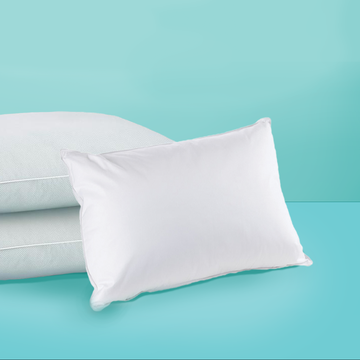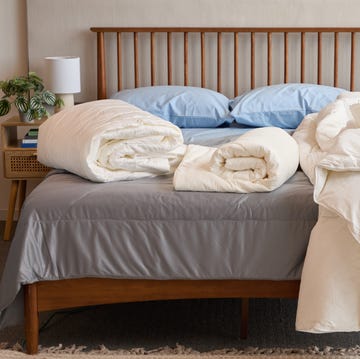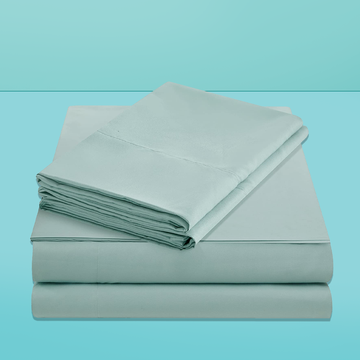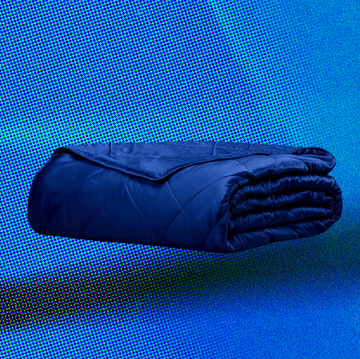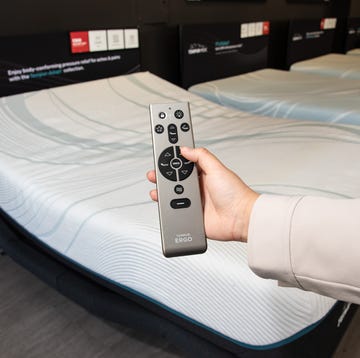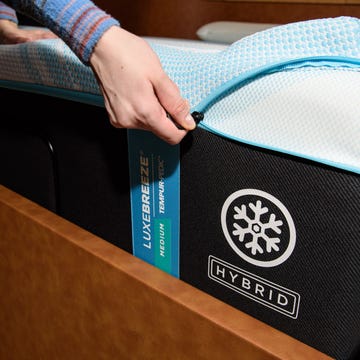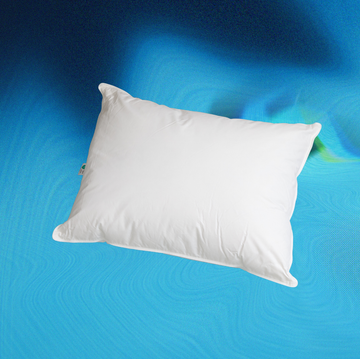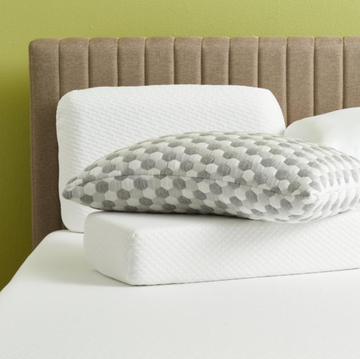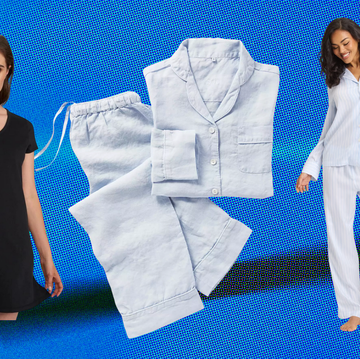Sleep Number and Tempur-Pedic are two of the most well-known brands within the ever-growing mattress industry. Both have decades of experience developing sleep technology, having been founded in 1987 and 1992 respectively, and both continue to be leaders within the space.
Each brand is known for its innovation: Sleep Number, under the name Select Comfort, further advanced the adjustable mattress, growing its popularity with its customizable technology. Meanwhile, Tempur-Pedic offered a product unlike anything else on the market when it introduced the memory foam mattress — now one of the most popular mattress materials that's known for its unique, pressure-relieving feel.
But given that both brands have impressive histories and top-notch products — which brand is better, Sleep Number or Tempur-Pedic? In this review, we'll unpack the difference between each brand's most popular mattresses, from overall design and material makeup to real-life performance based on feedback from over 600 users. After all, at the Good Housekeeping Institute Textiles Lab, we've evaluated hundreds of mattresses, resulting in over 10,000 data points for the two brands in question.
What's the main difference? Sleep Number mattresses offer precise adjustable firmness control using built-in air chambers and sensors along with integrated bases, from standard options to adjustable beds. Tempur-Pedic mattresses provide incomparable pressure relief, thanks to their specialized, proprietary memory foam. Tempur-Pedic also sells high-end smart adjustable bases separately. Choose Sleep Number if you struggle with finding the perfect firmness or opt for Tempur-Pedic if you're after cloud-like comfort.
Popular models
Materials
Sleep Number
To achieve firmness control, Sleep Number uses air chambers, so you can "find your number" for your best sleep. Each mattress also comes with layers of foam for comfort. Embedded biometric sensors can tell when you change positions in your sleep, so the air chambers can automatically adjust to keep you at your preferred firmness. The i8 is part of the Innovation Series, meaning it comes with more comfort layers and extra ceramic-infused gel, which draws excess heat from your body.
Tempur-Pedic
Tempur-Pedic has honed its slow-response memory foam to maximize pressure relief over the years. The material molds to the shape of your body as you sleep and provides both comfort and the necessary support to keep you in alignment. While foam is known to trap heat over time — and the Tempur material is no exception — the ProBreeze offers a hybrid version (in a medium level of firmness) with foam on top of coils which allows for more airflow. Tempur-Pedic also has a cooling mattress line, the Breeze, which uses the same foam with integrated phase change technology to create layers that are designed to pull away heat from your body.
Firmness levels
When we surveyed our readers for their thoughts on the mattress-buying experience, a great majority reported that firmness was a top concern when shopping for mattresses. While Tempur-Pedic's ProAdapt comes in multiple firmness options (Soft, Medium, Medium Hybrid and Firm), Sleep Number's completely customizable controls can't be beat. A 1–100 range means 100 firmness options at your fingertips at all times.
Performance
Overall comfort and support
Many of our survey respondents who own one bed of these beds have tried the other, but the verdict is still inconclusive. After our analysis, we found our panelists were perfectly split. Some strongly preferred Tempur-Pedic while others championed Sleep Number.
Both mattresses offer different types of comfort and support. Users who like Tempur-Pedic's beds praised the pressure relief and highlighted how the foam supported every part of their body with ample cushioning. On the other hand, many of those who preferred Sleep Number shared that they didn't like the sink-in feel of Tempur-Pedic and especially appreciated being able to switch between different firmness levels. Some also commented that while they loved sleeping on Tempur-Pedic mattresses, they often slept hot and said they didn't have that issue on a Sleep Number bed.
Motion isolation
While Sleep Number's motion isolation is nothing to scoff at, nothing compares to memory foam. Tempur-Pedic's foam mattresses (and even its hybrid models) offer best-in-class motion isolation. One user told us, "I can't even tell if my husband turns over or gets out of bed."
Edge support
None of our reviewers had issues sleeping near the edge, but, in our test, mattresses with substantial layers of memory foam often have less support around the perimeter. In this category, Sleep Number slightly edges out Tempur-Pedic.
Ordering, delivery and trial period
Tempur-Pedic mattresses (excluding the boxed Tempur-Cloud) come with free white glove delivery, meaning a team will set up your new mattress in the room of your choice and haul away your old mattress if desired. Sleep Number charges $249 for full-service setup and delivery, but this process is more involved, as the delivery personnel will also go through user controls and teach you how to use the app, which our panelists found extremely helpful.
Both brands also offer trial periods when purchasing directly from the site. Sleep Number's trial period is 100 days whereas Tempur-Pedic's is 90 days. Each trial period comes with a 30-night minimum, so if you're still unhappy after 30 nights, you can contact customer service to initiate a return. Note that Tempur-Pedic charges a return shipping fee of $175, and Sleep Number charges a pickup fee of $249.
Pricing
There's no denying that both brands come at a high cost. The Tempur-Pedic ProAdapt retails for between $2,899 and $5,798 depending on mattress size. It's the mid-tier option of Tempur-Pedic's popular Adapt line. In comparison, the Sleep Number i8 is priced from $3,399 to $5,799 (without a base) and comes from one of Sleep Number's higher tiers.
If you're interested in the unique technologies but are hesitant on the price, consider other models. Tempur-Pedic's boxed mattress, the Tempur-Cloud is one of our top mattress-in-a-box picks and offers the same contouring feel. Sleep Number's p6 mattress is also a favorite among our experts and survey panelists. It has fewer comfort layers and less ceramic gel, but you'll still have the firmness control that sets the brand apart. We're also currently testing the c2 smart bed (the brand's most affordable mattress), and our reviewers have been impressed so far.
Other bedding products
Adjustable bases
While both Sleep Number and Tempur-Pedic have great mattresses, their adjustable bed bases are some of the best on the market. Sleep Number's mattresses must be paired with its integrated bases, and you have the option of choosing between two non-adjustable and three adjustable versions, with varying features like foot warming and under-bed lighting. Tempur-Pedic's adjustable bases are sold separately and are compatible with all of its mattresses. The brand offers four bases, from basic to advanced, including features ranging from head and foot adjustability to extra lumbar support, built-in speakers and massage modes.
All adjustable beds from both brands are final sale, and both Tempur-Pedic and Sleep Number say they can be used with compatible mattresses from other brands. Non-adjustable Sleep Number bases can be returned with the mattress under the brand's 100-night trial.
The bottom line: Which brand is better?
Now that we've gone over the differences between the most popular Sleep Number and Tempur-Pedic mattresses, it's time for the final call. While we'd love to give a definitive answer, the truth is that it really comes down to personal preference — and what type of sleeper you are.
In terms of customer service and product quality, both Tempur-Pedic and Sleep Number are solid long-term investments. But if you sleep with a partner who favors a different sleep position and firmness level than you, we found that Sleep Number offers more personalized comfort. If you're a memory foam lover or side sleeper, we think you'll prefer a Tempur-Pedic mattress.
Why trust Good Housekeeping?
The Good Housekeeping Institute Textiles Lab has been testing bedding and home products for over a century. Each year, our experts research and review hundreds of mattresses in addition to surveying our readers, organizing consumer testing and analyzing countless data points.
Grace Wu is a textiles product review analyst at the Good Housekeeping Institute and oversaw recent at-home mattress testing of over 100 models. She's written several stories about mattresses and bed bases, including the best smart mattresses, the best mattresses for back pain and the best adjustable beds. Before joining GH, Grace earned a Master of Engineering in materials science and engineering and a Bachelor of Science in fiber science from Cornell University.
Grace Wu (she/her) is a product reviews analyst at the Good Housekeeping Institute's Textiles, Paper and Apparel Lab, where she evaluates fabric-based products using specialized equipment and consumer tester data. Prior to starting at Good Housekeeping in 2022, she earned a master of engineering in materials science and engineering and a bachelor of science in fiber science from Cornell University. While earning her degrees, Grace worked in research laboratories for smart textiles and nanotechnology and held internships at Open Style Lab and Rent the Runway.




